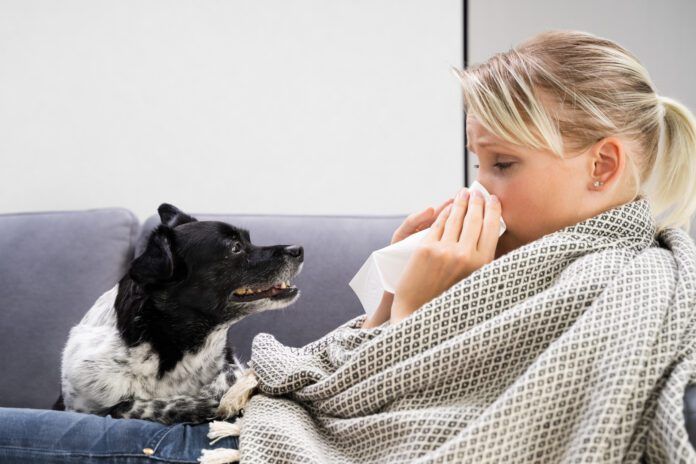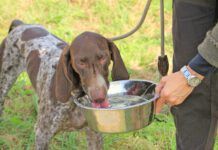Can dogs get sick from humans? Can humans get sick from dogs? The answer to both questions is yes.
Certain bacteria, viruses, and parasites are zoonotic, meaning they can spread from animals to humans. Reverse zoonosis occurs when humans transmit germs to dogs.
“We’re all mammals, and there are certain diseases that can cross over in either direction, so we have to be a little concerned about those things,” says veterinarian Will Sander, an assistant professor of preventive medicine and public health at the University of Illinois College of Veterinary Medicine.
So, what organisms and critters can spread from humans to canines and vice versa? Let’s break down these crossover contagions.
Can Dogs Get Sick from Humans?
Though it’s relatively rare, humans can pass germs to dogs. “Many of us live very closely with our dogs, and we can share diseases that way,” Dr. Sander says.
Diseases that dogs can catch from humans include:
COVID-19
The virus that causes COVID-19 is one of the most recent and headline-grabbing examples of reverse zoonosis.
“We had somewhere between 200 and 300 cases reported where dogs got sick from people,” Dr. Sander says. “A very, very small number of those dogs died. Most just got some gastrointestinal and respiratory effects.”
Tuberculosis/TB
People can also transmit bacterial infections to dogs. Tuberculosis (TB) is a highly contagious respiratory illness. It can spread from infected people to canines through close contact with a dog or even through the air inside a home. (TB is rare in dogs, but dogs can also transmit it to people.)
MRSA
Methicillin-resistant Staphylococcus aureus (MRSA) is another bacteria that dogs can pick up from humans, especially if a pooch licks the skin of an infected person.
“Dogs don’t actually have Staphylococcus aureus that much on their skin,” Dr. Sander says. “It’s more of a human bacterium, and so when we see things like MRSA, it’s usually coming from their family, and that somebody in that family has had an MRSA infection.”
E.coli
E.coli bacteria can be passed between two and four-legged family members. Dr. Sander says there have been cases where E. coli was the culprit that caused urinary tract infections, which spread throughout entire households, including the dog.
“It could happen when somebody with a urinary tract infection does not wash their hands well, or the dog licks the toilet bowl and gets infected,” Dr. Sander says.
Can Humans Get Sick from Dogs
While many infections in dogs do not pose a risk of spreading to people, there are several viruses, bacteria, and parasites that dogs can transmit to humans, both directly and indirectly.
Stopping germs from spreading is something veterinarian Stephanie Janeczko, vice president of shelter medicine services for the ASPCA, considers a top priority.
“Infectious diseases are certainly an ongoing concern, particularly in settings where dogs have close contact with many other dogs,” Dr. Janeczko says. “They are something that we absolutely spend a lot of time working to prevent in shelter settings.”
Infections that humans can get from dogs include:
E.coli, Salmonella, and Campylobacter
Dogs can also spread E. coli and other bacteria, like Salmonella and Campylobacter, to humans through their feces. But Dr. Janeczko and other veterinarians also warn about the potential indirect spread of bacteria to humans from certain dog foods.
“We know that people exposed to dogs who are fed raw diets are at increased risk of exposure,” Dr. Janeczko says. “It might be because you were handling that food that was contaminated, then you became exposed, too.”
While medical experts may have differing opinions about raw diets and the risks, these types of bacteria can cause serious infections, even death, in humans and dogs.
Leptospirosis
Another potentially dangerous organism that veterinarians urge should be on more people’s radar is Leptospira bacteria, which causes leptospirosis, also known as lepto.
For pet owners asking their veterinarians, “Is leptospirosis zoonotic?”, the answer is: It’s one of the most common and dangerous zoonotic diseases in the world.
“We’re actually seeing more leptospirosis in dogs over the last couple of decades,” Dr. Sander says.
Leptospira bacteria are spread through the urine of infected wild, farm, and domestic animals. Dogs can contract it if they come into contact with contaminated soil, other infected animals, or their remains. Lepto can also spread in floodwaters, rivers, lakes, and ponds.
Without treatment, leptospirosis can make animals and people very ill, even causing death.
Rabies
And while we’re talking worst-case scenarios, canines (and other animals) can spread the deadly rabies virus to humans.
Dogs typically contract rabies after being bitten by an infected wild animal or a domestic animal (such as a dog or cat) that has contracted the disease. The virus is transmitted through saliva, so if a rabid dog bites a human or licks a person’s open wound, they can become infected.
“It’s really serious,” Dr. Sander says. “It’s one of those few diseases we know of that’s usually 100% fatal. It’s one of those you don’t want to play around with.”
Common Dog Diseases That Don’t Spread to Humans
While serious viruses like parvo and distemper can easily spread between dogs, they are not contagious to people.
Is Influenza Zoonotic?
Can people give their dogs the flu? Can dogs give people influenza?
The short answer is “sometimes.” There are various strains of influenza, and some are zoonotic. Also, flu viruses are constantly changing and can mutate in ways that affect their ability to spread between species.
“The way the virus is set up, it’s prone to having a lot of mutations,” Dr. Sander says. “When those mutations happen, we see shifts. Things are always shifting and changing.”
It’s always a good idea to consult the latest research or seek medical advice if you have questions, but here is the current information on several strains of influenza as of this writing:
Dog Flu/Canine Influenza
Although the dog flu, or canine influenza, is highly contagious among dogs, there have been no reported cases of humans contracting the virus that causes the disease.
Avian Influenza/Bird Flu
Avian influenza, which has jumped from birds to cows to cats (cats are very susceptible) and to humans, is a hot topic these days. Right now, the risk of dogs contracting bird flu remains low. “We have been fortunate that dogs have not been impacted,” Dr. Sander says.
Of course, if a dog eats or interacts with infected animals, they run a greater risk of contracting the disease. The key is to limit potential exposure to the virus.
Human Flu (Influenza A and B)
While the flu can make most people absolutely miserable and spread easily among humans, it’s unlikely dogs will contract it.
“There have been a few cases, but it’s pretty uncommon that the flu has been able to spread from people to dogs,” Dr. Sander says.
Preventing the Spread of Zoonotic Disease
Several common-sense precautions can help prevent the spread of infections, which can help save the lives of both people and dogs.
Vaccinations
Always ensure dogs are up to date on their vaccinations.
“Vaccines are a cornerstone of the way that we seek to limit transmission for several infectious diseases, some of which are zoonotic. This includes rabies and leptospirosis,” Dr. Janeczko says.
Pet owners should consult with their veterinarian to determine the best protocol for their dog, which should include core vaccines for parvovirus, distemper, rabies, and even leptospirosis.
“There’s been a good vaccine in place for quite a while for leptospirosis for dogs,” Dr. Sander says. “It’s something that the American Veterinary Medical Association and other big national animal associations have endorsed in the last two years as being considered a core vaccine for dogs.”
Flea, Tick, and Parasite Prevention
Fleas, ticks, and intestinal parasites are among the grossest, most disease-spreading critters that canines can bring home to their humans, which can, directly and indirectly, cause health issues for both species. Using broad-spectrum dewormers can help minimize the risk of intestinal parasitic infections dogs can pick up and pass to humans.
“Most people would be giving these as part of their monthly heartworm preventive; most have a dewormer in them that will provide protection against parasites like roundworms or hookworms,” Dr. Janeczko says.
Using pet flea and tick prevention can also help limit the exposure of both dogs and humans to many potentially dangerous diseases. Some ticks carry Lyme disease, Ehrlichiosis, Anaplasmosis, Rocky Mountain Spotted Fever, and Babesiosis.
Fleas may harbor germs like Bartonella, typhus, and the plague.
Topical, chewable, and spray-on preventatives help stop these biting bugs from infecting dogs and people.
Hand Hygiene
One of the easiest ways people can prevent the spread of germs is to wash their hands after having contact with their dog, their dog’s food and water bowls, and after picking up their pooch’s poop.
Pet parents should also follow safe food handling protocols when feeding their dogs to help reduce the risk of bacterial transmission.
“Hand hygiene goes a really long way in helping to mitigate infectious disease risk for zoonotic diseases,” Dr. Janeczko says. “That’s an important aspect of it.”
Safeguards During Sickness
Hand hygiene is also crucial in preventing the spread of diseases, especially when a pet or person is sick. People should wash their hands immediately after any direct contact with a dog or human who is ill or after touching anything they’ve touched. It’s essential to race for soap and water after cleaning up bodily fluids, such as urine, diarrhea, or vomit.
Don’t allow dogs to snuggle, kiss, lick people, or come in close contact with other animals or humans who are sick.
Wearing a mask and avoiding coughing or sneezing around dogs if someone in the household has a respiratory illness can help prevent dogs from contracting it.
If a dog or human appears to be sick, seek medical attention, and be sure to mention any other illnesses in the household, as well as the presence of pets.
“A lot of times physicians or nurse practitioners don’t always ask that question, and it opens up other possibilities for them to think about what could be causing you to be sick, too,” Dr. Sander says. “I always tell people to advocate for themselves and let doctors know what’s going on.”
The bottom line is that while you should be aware of the germs and parasites in your environment, they should not prevent you and your dog from having a loving relationship.
“The risk is not huge, but take common-sense precautions,” Dr. Sander says. “Good hygiene and preventive measures are really what’s needed, and just not letting our guard down.”






